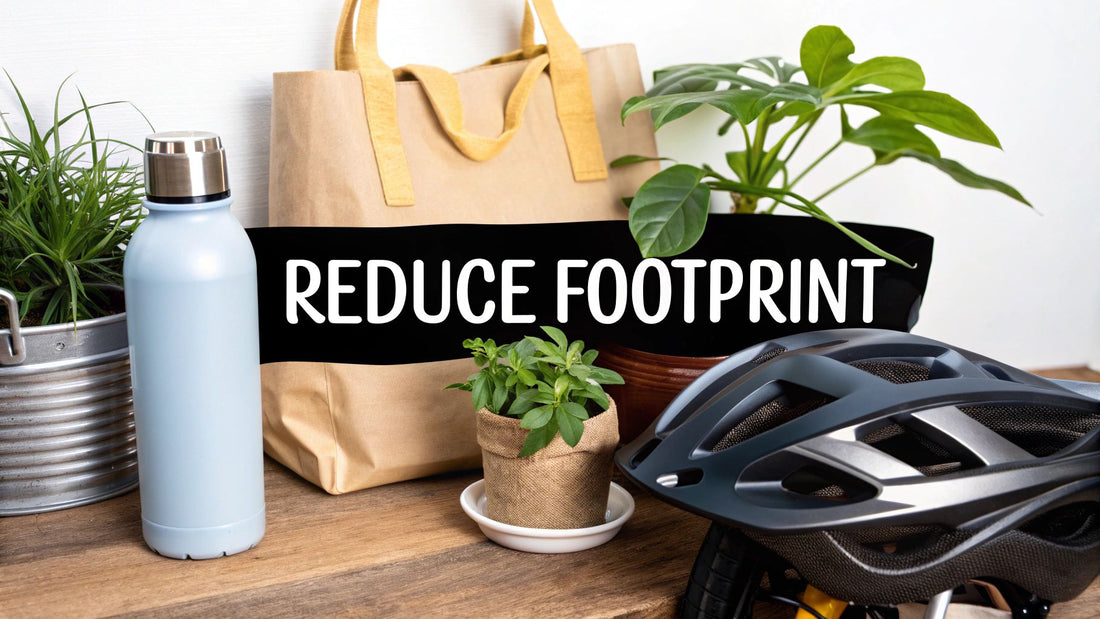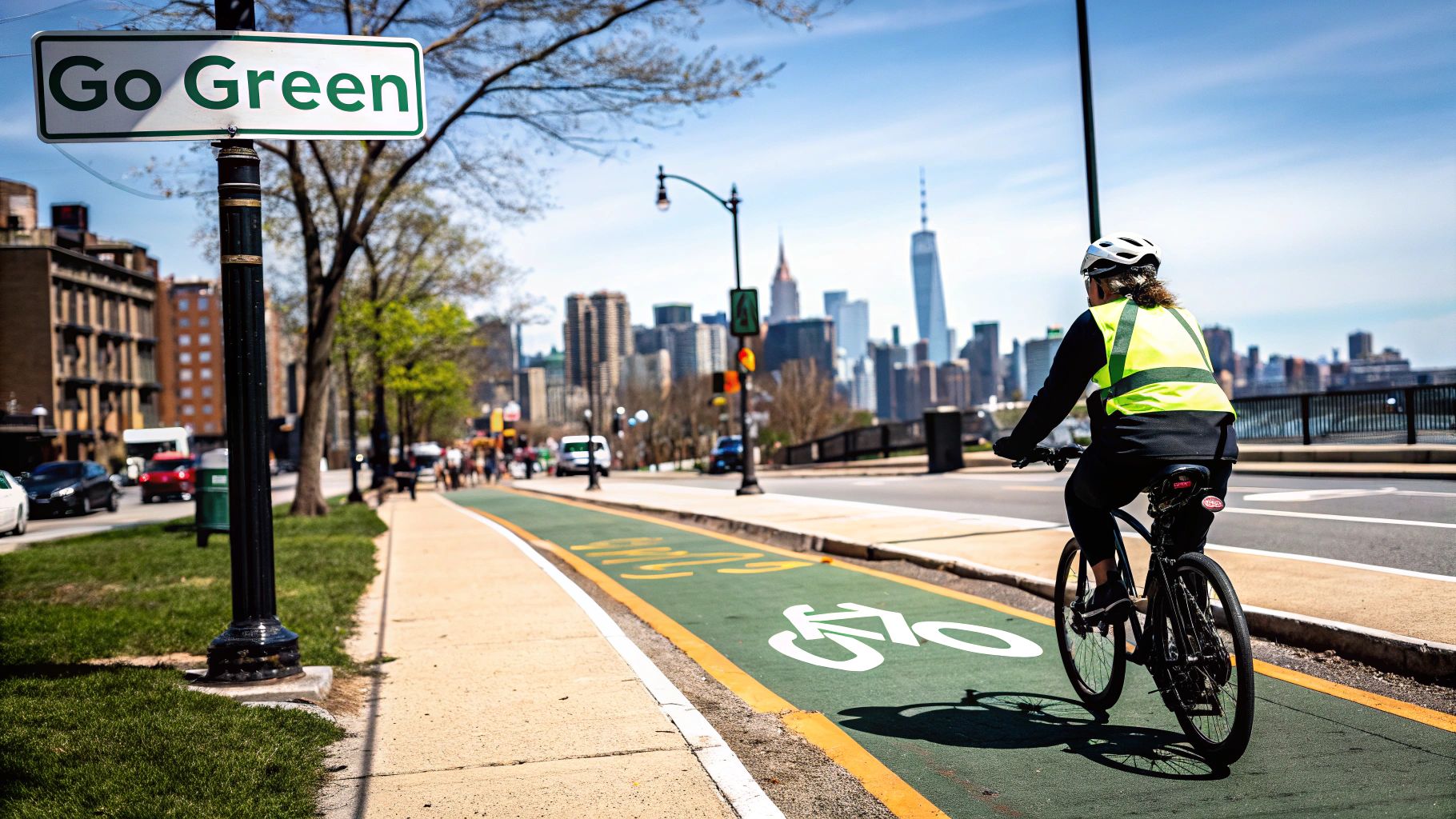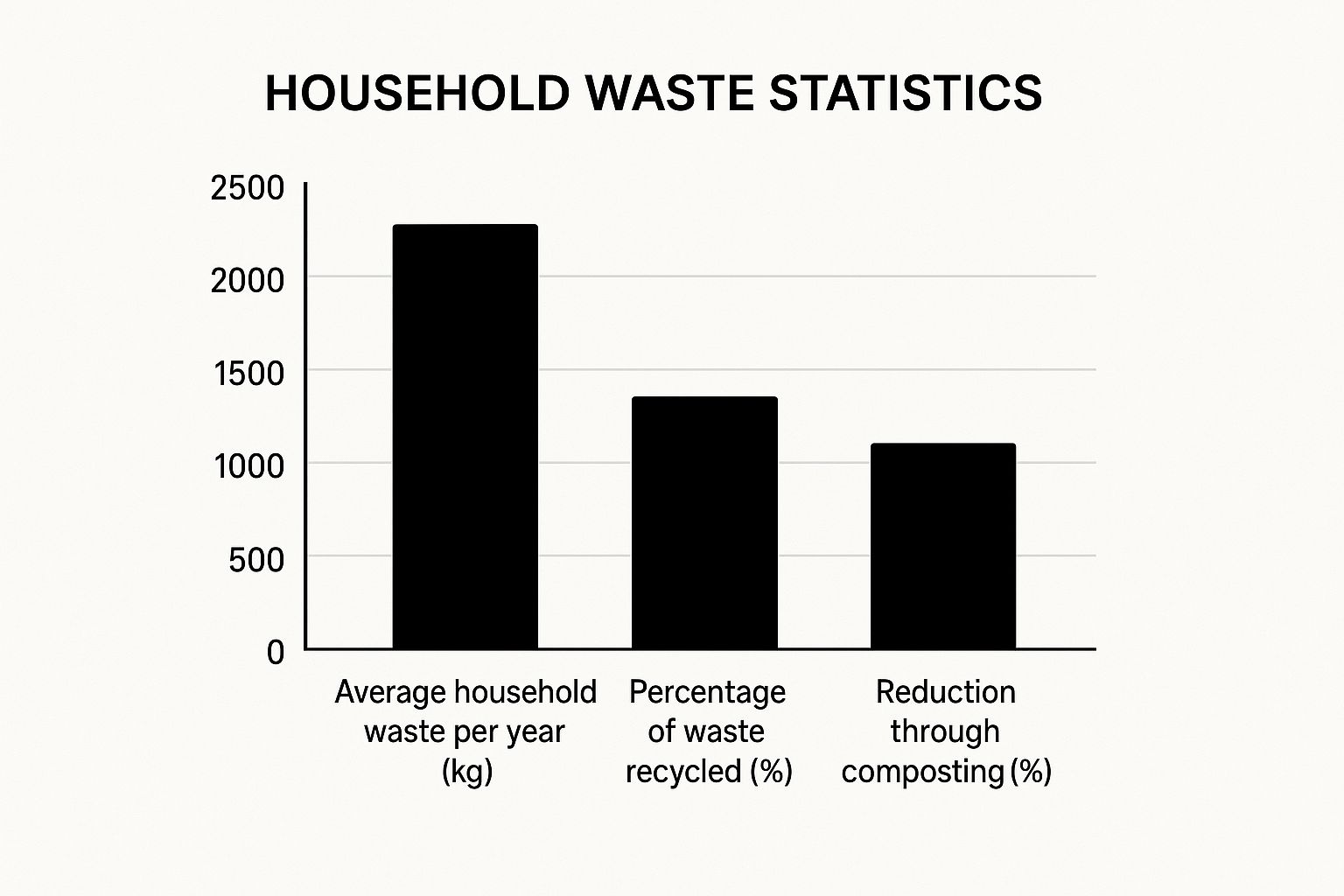
How to Reduce Your Environmental Footprint and Why It Matters More Than Ever
Share
Overwhelmed by the constant drumbeat of climate news? You’re not alone. But what if I told you that the power to create meaningful change isn't in the hands of far-off leaders, but right here with you? This isn't about guilt. It's about unleashing your power.
This guide is your playbook. It’s filled with practical, achievable strategies that prove that reducing your environmental footprint isn't a sacrifice—it's a smarter, more fulfilling way to live. Your daily choices are the frontline of change, and it’s time to see just how powerful they are.
First, Let's Understand Your Personal Impact
Before we can begin this journey, we have to grasp what your environmental footprint truly is. Forget abstract carbon numbers for a second. Your footprint is the sum total of your demands on our planet.
It’s the hidden river of water used to grow your morning coffee. It’s the ancient forest cleared for the furniture in your home. It's the mountain of resources consumed for a single online order. Every choice leaves a mark.
The urgency to act is undeniable. Global greenhouse gas emissions remain at a crisis level. In a single recent month, humanity pumped approximately 5.29 billion tonnes of CO2 equivalent into our atmosphere. While there was a minuscule 0.04% dip from the previous year, the cumulative total still hit a staggering 15.57 billion tonnes. This isn't just data; it's a direct threat to our shared future. You can see the unfiltered reality for yourself with the latest emissions data from Climate TRACE.
Don't let these numbers paralyze you. Let them ignite you. Understanding the scale of the problem is the first step toward becoming a powerful part of the solution.
Let’s zero in on the key battlegrounds where your choices can turn the tide.
Key Areas to Reduce Your Environmental Footprint
| Impact Area | Primary Action | Why It Matters |
|---|---|---|
| Consumption | Buy less, choose wisely. | Every product has a resource cost. Reducing consumption directly cuts down on waste, pollution, and resource depletion. |
| Home Energy | Reduce electricity and fuel use. | Powering and heating our homes is a major source of greenhouse gas emissions. Efficiency makes a huge dent. |
| Transportation | Drive less, fly smarter. | Cars and planes are significant contributors to carbon emissions. Shifting to public transit, biking, or walking helps. |
| Food & Diet | Eat more plants, waste less. | The food system, especially meat and dairy production, has a massive environmental footprint from land use to methane emissions. |
You're More Powerful Than You Think
It's a seductive lie to think, "I'm just one person, what can I do?" But history shows us that every major shift begins with individuals who dare to act. Your choices create a ripple effect that is far more potent than you can imagine.
When you and millions of others make the same small changes, it creates an economic earthquake. It screams a clear message to corporations and governments: the demand for a sustainable world is no longer negotiable.
This guide will empower you to make an impact where it counts most:
- At Home: Transforming your living space into a hub of efficiency.
- At Work: Championing small shifts that lead to big corporate change.
- On the Go: Redefining how you eat, shop, and travel for the better.
Your daily choices, when multiplied across neighborhoods and cities, build the momentum we need to shift markets and create real, lasting change for a healthier planet.
This is a journey of progress, not perfection. Every single adjustment helps lighten our collective load on the Earth. By taking these practical, manageable steps, you move from being a bystander to being a vital architect of a better future.
Rethinking How You Live at Home
Your home is the epicenter of your environmental impact, which means it’s also your greatest source of power. This isn't about vague advice. These are strategic, high-impact actions that will not only heal the planet but will visibly shrink your monthly bills.
It’s tempting to believe only grand gestures matter, but the profound truth is that consistent, small changes are what revolutionize your footprint. A year of conscious choices in your daily routine can slash your personal impact. It all starts with being deliberate about what you use.
Taming Your Home Energy Use
A colossal piece of your carbon footprint is forged in the energy your home consumes. The best part? This is where you can make immediate, tangible dents and see the proof on your next utility bill.
One of the most powerful upgrades you can make is installing a smart thermostat. This brilliant device learns your life’s rhythm, automatically adjusting the temperature so you stop paying to heat or cool an empty house. It can slash your heating costs by a staggering 10-15% a year. It's a true set-it-and-forget-it solution to chronic energy waste.
Lighting is another immediate victory. Simply swapping your five most-used light bulbs for energy-efficient LEDs can save you around $75 every year. When you realize LEDs consume up to 90% less energy and last an incredible 25 times longer than obsolete incandescent bulbs, the choice becomes obvious.
Here’s a secret corporations don’t want you to know: your electronics are energy vampires. They silently suck power 24/7, even when "off." This "phantom power" can inflate your electricity bill by up to 10%! The simple act of unplugging chargers or using a smart power strip severs this parasitic energy drain for good.
Smart Swaps in the Kitchen and Beyond
Electricity is just one part of the battle. The products we are conditioned to buy, use once, and discard create mountains of waste. Choosing reusability over disposability is a revolutionary act, and your kitchen is the perfect place to launch your campaign.
Here are a few simple swaps that deliver an outsized impact:
- Ditch plastic wrap for beeswax wraps. They are a brilliant, reusable shield for your food, sealing bowls and wrapping sandwiches without the toxic plastic waste.
- Trade paper towels for microfiber cloths. A single high-quality cloth can do the work of hundreds of rolls of paper towels, saving forests and money.
- Switch to reusable shopping bags. This is a non-negotiable. It is one of the easiest ways to keep an immense amount of plastic out of our dying oceans and choked landfills.
This is not about deprivation. It is about choosing superior, longer-lasting tools that perform better without generating trash. As you open your eyes to the possibilities, you'll discover a world of incredible eco-friendly household products that make this transition effortless.
These adjustments may feel small, but they are the bedrock of a sustainable life. By fundamentally rethinking your habits at home, you're doing far more than shrinking your own footprint—you are casting a daily vote for a healthier planet with every kilowatt saved and every piece of plastic refused.
The Power of Your Plate and Its Footprint
What you eat is a direct and powerful statement about the world you want to live in. Your food choices dictate the fate of our forests, the purity of our water, and the stability of our climate. If you are serious about reducing your environmental footprint, the battle begins on your plate.

Forget drastic, unsustainable diets. We're talking about mindful, strategic shifts that create a massive positive shockwave. It all starts with a simple question: "Where did this food come from, and what did it cost the Earth?"
Why Your Food Choices Matter So Much
The global food system is a primary engine of environmental destruction. Unfettered, unsustainable agriculture is responsible for a catastrophic 80% of global deforestation, wiping out biodiversity at an alarming rate.
Every year, we obliterate around 10 million hectares of forest—an area the size of Iceland—to clear land for farming. When you learn that food production is responsible for about 26% of all greenhouse gas emissions, the link between your fork and a stable climate becomes terrifyingly clear.
This knowledge is your weapon. One of the single most impactful changes you can make is to reduce your consumption of red meat. The beef industry is insatiable, demanding vast tracts of land, astronomical amounts of water, and generating far more emissions than plant-based proteins. You don't have to go vegan overnight. Simply embracing "Meatless Mondays" or swapping beef for lentils a few times a week will dramatically shrink your food footprint.
Embrace Local and Seasonal Eating
Another powerful strategy is to shorten the journey your food takes to reach you. By prioritizing local and seasonal produce, you obliterate "food miles" and the carbon pollution spewed from long-haul trucks, refrigeration, and chemical preservatives.
Shopping at a local farmers' market is a triple victory:
- Superior food: You taste produce at its absolute peak, not something picked weeks early to survive a global journey. The flavor is incomparable.
- Resilient community: Your money directly fuels your local economy, supporting the farm families who are your neighbors.
- Zero waste: You'll immediately notice that market food has minimal to no plastic packaging, unlike the plastic-entombed produce at the supermarket.
By syncing your meals with the seasons, you're not just eating better food. You're casting a vote for a more sustainable and resilient food system with every dollar.
Conquer Food Waste for Good
Food waste is the great, silent villain in this story. When you throw away food, you are throwing away the water, land, and energy that were sacrificed to produce it. Even worse, rotting food in a landfill releases methane, a greenhouse gas far more potent than carbon dioxide.
The solution begins with one simple act: planning. Before you shop, audit your kitchen. Plan your meals for the week so you buy only what you will absolutely use. This habit alone will stop waste in its tracks and save you a shocking amount of money.
And for the scraps you can't avoid, like coffee grounds and vegetable peels? Composting is your secret weapon. It transforms "waste" into nutrient-rich gold for your garden. If you're ready to start, our guide on how to compost at home makes it incredibly simple.
Making Your Travel and Commute More Sustainable
Transportation is a massive piece of our collective carbon puzzle, but attacking it is easier than you think. Every trip, from the daily grind to the yearly getaway, leaves a scar on the planet. The key to healing it is to fundamentally rethink how you move.
You will be stunned by the power of small adjustments. Imagine replacing just one car trip each week with a bike ride or public transit. That single, repeated action demolishes emissions, saves you money, and delivers a powerful boost to your own health and well-being.
Smart Strategies for Your Daily Commute
Even if a car is a daily necessity, you are not powerless. You can dramatically reduce its impact with a few simple, conscious habits.
Meticulous car maintenance is your first line of defense. Just ensuring your tires are properly inflated can boost your gas mileage by over 3%. That may not sound like much, but over a year of driving, it represents a significant saving in both cash and carbon.
Next, change how you drive. Aggressive driving—hard acceleration, sudden braking—is a fuel-wasting disaster. Adopting a smoother, more deliberate driving style is not only better for the planet but saves you money and reduces wear on your vehicle.
Of course, if you're in the market for a new car, choosing an electric vehicle (EV) is a revolutionary act. While the initial cost can be higher, the long-term rewards are immense. EVs have zero tailpipe emissions and radically lower running costs, making them a brilliant investment for both your wallet and the planet.
Let's put this into stark perspective.
Comparing Commute Footprints
This table reveals the staggering difference in the carbon footprint of a typical 10-mile daily commute over one year. The choice is clear.
| Transportation Mode | Estimated Annual CO2e | Key Considerations |
|---|---|---|
| Gasoline Car (Solo) | ~4,200 kg | The destructive baseline for most commuters. |
| Electric Vehicle (EV) | ~1,600 kg | Varies by electricity grid source. |
| Public Bus | ~1,200 kg | Shared impact dramatically reduces individual footprint. |
| Carpool (2 people) | ~2,100 kg | Instantly halves your personal emissions per trip. |
| Bicycle / Walking | 0 kg | The ultimate zero-emission, health-boosting choice. |
As you can see, simply sharing a ride or going electric creates a massive positive impact. But nothing comes close to the clean, empowering act of using your own two feet.
Leaving your car at home—even just once in a while—is a powerful statement. It means cleaner air for your community, less traffic on the roads, and a collective step toward a more sustainable way of getting around.

The data here shows that while we all produce waste, simple actions like recycling and composting can keep a huge portion of it out of our landfills.
Flying with a Lighter Footprint
Let’s be brutally honest: air travel has a devastating environmental impact. But when flying is unavoidable, you can still take steps to mitigate the harm.
Booking a direct flight is the single most effective tactic. A colossal amount of an airplane's fuel is incinerated during takeoff and landing. By eliminating layovers, you eliminate an entire cycle of this high-emission activity.
Packing light is not trivial; it's a real contribution. The heavier the plane, the more fuel it must burn. By leaving those extra shoes behind, you are doing your part to reduce the aircraft's total weight and, consequently, its carbon emissions for the flight.
Using Your Voice and Wallet for Broader Change
The choices you make at home are the beginning. Your true power is amplified exponentially when you carry that conscious mindset into the world. As a discerning consumer and an engaged citizen, you can send shockwaves through the economy, reshaping entire markets and influencing national policy. This is how we scale individual action into a global movement.

It starts with where you send your money. Every dollar you spend is a vote cast for the kind of world you demand. When you deliberately choose to support businesses that are genuinely committed to sustainability, you fuel a revolution of responsible practices across all industries.
Vote with Your Wallet Every Day
Being a conscious consumer means seeing past the slick marketing and deceptive green labels. Many corporations engage in "greenwashing"—spending millions to appear eco-friendly while their practices remain destructive. Your mission is to learn to see through the facade.
Look for undeniable proof, not vague, feel-good promises.
- Seek out certifications: Hunt for trusted, third-party seals of approval. Labels like Fair Trade, USDA Organic, or B Corp certification are not marketing gimmicks; they are hard-won credentials proving a company meets rigorous standards for social and environmental performance.
- Support local businesses: Choosing the local farmers' market or neighborhood shop is a strategic victory. It means less packaging, radically shorter supply chains, and a direct investment in the economic health of your own community.
- Demand transparency: Give your loyalty to brands that are radically honest about their supply chains. The truly sustainable companies are proud to show you how their products are made.
Conscious consumerism isn't about perfection. It's about intention. Every single time you choose a local shop over a faceless megacorporation, you send a powerful message that sustainability is your priority.
This powerful mindset applies to every purchase you make. Once you begin, you will instinctively seek ways to reject single-use items. We arm you with more strategies in our definitive guide on how to reduce plastic waste.
Use Your Voice to Drive Systemic Change
Your wallet is a powerful weapon, but your voice as a citizen is a force of nature. True, lasting change requires policies that unleash renewable energy, protect our wild places, and build a sustainable infrastructure. You have a critical role to play in making that happen.
This doesn't mean you must become a full-time activist. It can be as simple as signing a petition for more bike lanes in your town or emailing your representative to demand support for a community solar project.
When you and your neighbors speak up in unison, leaders are forced to listen. This collective pressure is what forges the large-scale, systemic change we desperately need. Your voice, joined with a chorus of others, builds the unstoppable momentum required for a truly sustainable future.
Common Questions About Reducing Your Footprint
Embarking on this path to reduce your environmental footprint will naturally spark questions. It’s normal to wonder if your efforts truly matter or if a sustainable life is an expensive, complicated fantasy. Let's dismantle these myths so you can move forward with absolute clarity and conviction.
Do My Small Actions Really Make a Difference?
Yes. A thousand times, yes. It's a calculated tactic by polluters to make you feel like a powerless drop in the ocean. But that ocean is nothing more than a collection of individual drops. Every time you choose a reusable bag or bike to work, you are joining a massive, global chorus of people making the same defiant choice.
This collective action is a force that cannot be ignored. It proves to corporations that a vast market for sustainable products exists, and it signals to politicians that protecting our environment is a non-negotiable voting issue. Beyond that, your actions inspire those around you—your friends, family, and community—multiplying your impact far beyond what you can see.
Isn't Living a Sustainable Lifestyle Expensive?
This is the biggest and most pervasive lie. While some high-tech eco-gadgets may have an initial investment, the fundamental truth is that a sustainable lifestyle is a direct path to financial freedom.
Consider the evidence:
- Lower Utility Bills: When you slash your energy and water consumption, you are directly slashing your monthly bills. It is that simple.
- Less Spending: Buying fewer things, repairing what you own, and eliminating food waste result in enormous savings.
- Smarter Shopping: Choosing secondhand is almost always cheaper than buying new, and you are liberating valuable items from the landfill.
The core principle of sustainability is to consume less. This mindset shift is, almost without exception, a financial victory.
The goal isn't perfection; it's progress. Don't let the idea of an expensive, complete overhaul stop you from taking the first simple, cost-effective steps today.
I'm Overwhelmed. Where Do I Even Start?
Feeling overwhelmed is a sign that you care deeply. But it can lead to inaction. The secret is to reject the idea that you must change everything at once. Pick one or two areas that feel most urgent and achievable for you right now.
For many, tackling food waste is the perfect entry point. It has a colossal environmental impact, and the savings on your grocery bill are immediate and motivating. Another easy win? Make a non-negotiable commitment to using a reusable water bottle, coffee cup, and shopping bags.
Once those actions become effortless habits, you build on them. You layer in the next change, like being more mindful of your energy use or altering your commute just one day a week. This is how a revolution begins.
How Does My Footprint Compare to Others?
Understanding the global context can be a powerful motivator. Our consumption-driven lifestyles are the primary driver of environmental collapse, and the disparity across the globe is stark.
For instance, the United States has an enormous ecological footprint, averaging about 7.8 global hectares (gha) per person, while its own environment can only sustainably support 3.7 gha. This means U.S. residents consume resources at a rate roughly 50% higher than people in most European countries. This is directly tied to larger homes, a deep reliance on cars, and higher overall energy consumption. You can explore the dramatic differences between countries with this global footprint comparison.
Ready to take the next simple step? At terravera, we believe that small, sustainable swaps should be easy and accessible. From our Niya Organica Castor Oil to our fully compostable bags, we provide practical products that help you reduce your environmental footprint without sacrificing quality. Make a conscious choice today and explore our collection at https://www.myterravera.com.
